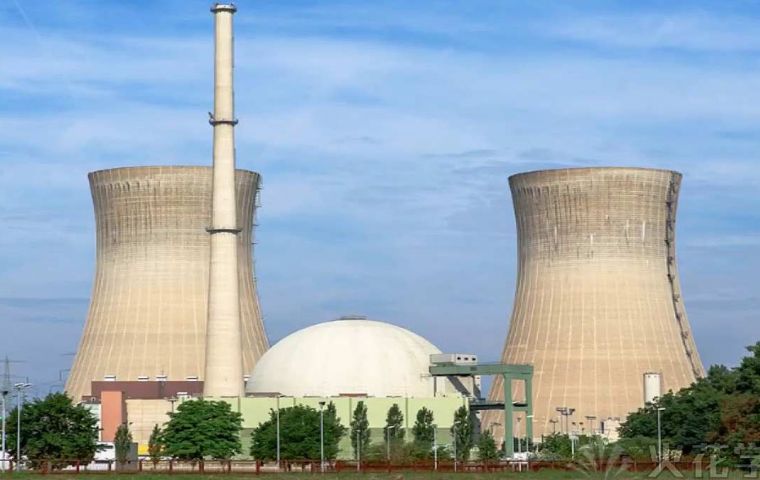MercoPress. South Atlantic News Agency
Nuclear energy era comes to an end in Germany
 “The risks linked to nuclear power are definitely not manageable even in a high-tech country like Germany,” Environment Minister Steffi Lemke said
“The risks linked to nuclear power are definitely not manageable even in a high-tech country like Germany,” Environment Minister Steffi Lemke said The era of nuclear reactors came to an end in Germany Saturday after the three last such plants were shut down as the country enters a new energy chapter, facing the challenge of doing without fossil fuels while at the same time managing the gas crisis triggered by the war in Ukraine.
The Isar 2 (southeast), Neckarswestheim (southwest), and Emsland (northwest) power plants were disconnected from the grid after Berlin dismissed last-minute requests to put off the measure. The German government had agreed to a postponement of several weeks from the initially planned date of December 31, but without calling into question the decision to turn the page on this type of energy.
“The risks linked to nuclear power are definitely not manageable even in a high-tech country like Germany,” Environment Minister Steffi Lemke said. In Germany, the fight against the risks associated with the civilian use of nuclear power has been mobilizing broad sections of the population for decades and has laid the foundations for the environmental movement.
At the forefront of the fight against nuclear power, the NGO Greenpeace organized a farewell celebration at the Brandenburg Gate in Berlin: “At last, nuclear power is history! Let's make this April 15 a memorable day,” it proclaimed.
After an initial decision by Berlin in the early 2000s to phase out atomic power, former Chancellor Angela Merkel accelerated the process after the Fukushima catastrophe in 2011. Since 2003, Germany has already shut down 16 reactors.
The invasion of Ukraine on February 24, 2022, might have thrown everything into question because Germany, deprived of Russian gas, feared worst-case scenarios, from the risk of shutting down its factories to running out of heating sources for the winter. But the season passed without shortages and Russian gas was replaced by other suppliers. Nevertheless, a recent poll for the broadcasters ARD showed 59% of respondents thought that abandoning nuclear power in this context was not a good idea. Two-thirds of respondents who wanted to keep the reactors running said they were concerned that energy prices would rise when nuclear power energy is lost.
The last three plants provided only 6% of the energy produced in the country last year, while nuclear power accounted for 30.8% in 1997, while the share of renewables in total production has risen to 46% in 2022, up from less than 25% a decade earlier.
“After 20 years of energy transition, renewables now produce about one-and-a-half times more electricity than nuclear power at its peak in Germany,” Simon Müller, director of the Agora Energiewende research center specializing in energy transition, told AFP.
“Politicians need to adjust to changed circumstances, and I accuse the government of not doing that at all,” opposition party lawmaker Albert Stegemann told the Associated Press.
But in Germany, the European Union's leading CO2 emitter, coal still accounts for a third of electricity production, with an 8% increase last year to compensate for the absence of Russian gas. Even Swedish activist Greta Thunberg lashed out at Berlin, claiming that it would be better to continue using power plants to reduce coal use.
Germany prefers to focus on its target of meeting 80% of its electricity needs with renewables by 2030 and shutting down its coal-fired plants by 2038 at the latest. For the time being, the country is ramping up imports of liquefied natural gas (LNG), including cargoes from the US, and plans to boost its LNG import capacity more than fivefold by 2030, to nearly 71 million tons annually.
Scholz has warned that Germany will need to install four to five new wind turbines each day over the next few years to meet its power-supply needs. That would be about triple last year’s pace average of 1.5 per day.




Top Comments
Disclaimer & comment rules-

-

Read all commentsWhat a joke
Apr 17th, 2023 - 07:49 pm 0On the same day as this announcement E.ON announced a 45% increase in electricity prices for their German customers
As per this article “Germany will need to install four to five new wind turbines each day over the next few years to meet its power-supply needs. That would be about triple last year’s pace average of 1.5 per day.”
Guess the Germans will need to blow a little harder on their existing windmills
They will need to do something on days when the wind doesn’t blow.
Apr 20th, 2023 - 12:47 pm 0Commenting for this story is now closed.
If you have a Facebook account, become a fan and comment on our Facebook Page!